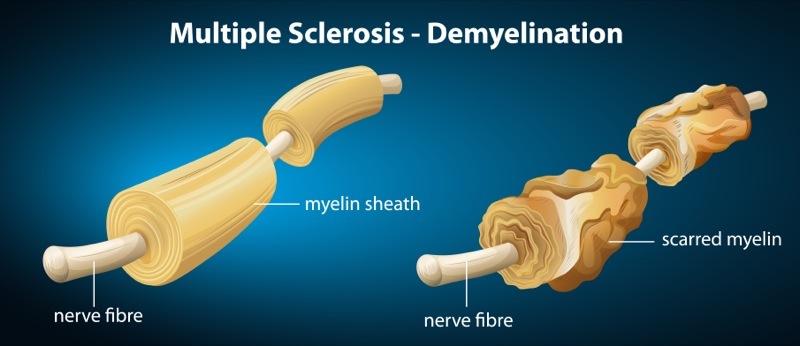MicroRNA Therapy Restored Myelin Production, Limb Function in MS Mouse Model
Written by |

Using a small RNA molecule belonging to the family of microRNAs (miRs), scientists could restore myelin in nerve cells and improve limb function in mouse models of human multiple sclerosis (MS).
The study, “miR-219 Cooperates with miR-338 in Myelination and Promotes Myelin Repair in the CNS,” was published in the journal Developmental Cell.
While miRNAs had been previously implicated in the formation of oligodendrocytes (a process known as oligodendrogenesis; oligodendrocytes are cells able to create myelin), their role in myelin regeneration had been unknown.
Myelin is the insulator layer that protects axons in nerve cells and allows an efficient transmission of electrical impulses that stimulates movement.
The team of scientists at Cincinnati Children’s Hospital Medical Center showed that one particular microRNA – miR-219 – was critical for myelin regeneration in the central nervous system (CNS) after an injury. Moreover, they found a second microRNA, miR-338, that if deleted was also important for the remyelination process mediated by miR-219.
To understand the role of miR-219, scientists used a mouse model for MS, the experimental autoimmune encephalomyelitis (EAE) model, and another mouse model that mimics the damaged nerve cells of MS by being injected with a chemical called lysolecithin.
The team then administered a synthesized version of miR-219 into the spinal columns and cerebrospinal fluid of these mice and observed that the treatment promoted the function of the damaged oligodendrocytes, restoring myelin production.
“We show that miR-219 targets multiple processes that inhibit myelin formation after nerve injury by the disease process, and that treatment with this microRNA partially restores myelination and limb function,” said Qing Richard Lu, PhD, the study’s lead author and scientific director of the Brain Tumor Center at Cincinnati Children’s, in a press release.
The team found that miR-219 is an essential player in a large network that blocks molecules that inhibit the oligodendrocytes from performing their main function as myelin producers.
“It is conceivable that augmenting miR-219 treatment with other blockers of myelin regrowth may provide a multipoint treatment strategy for people with demyelinating diseases like MS,” they wrote.
Scientists noted, however, that more studies are required before testing this strategy in humans.
The team is now focusing on developing additional mimics of miR-219 and formulating new methods for its even more efficient delivery, particularly into brain tissue.


